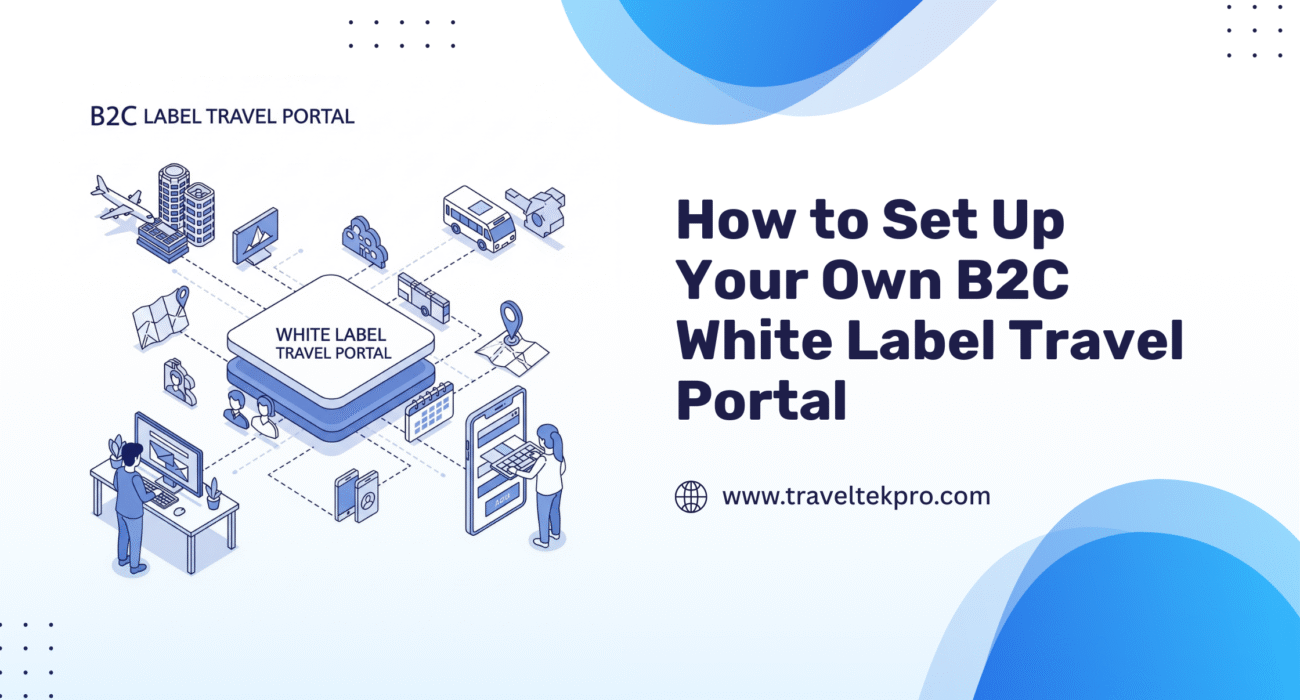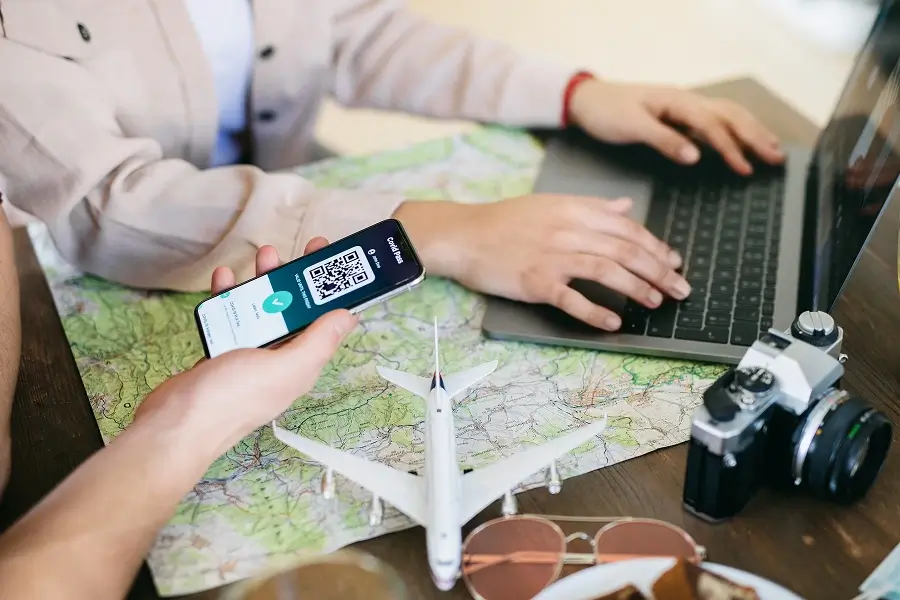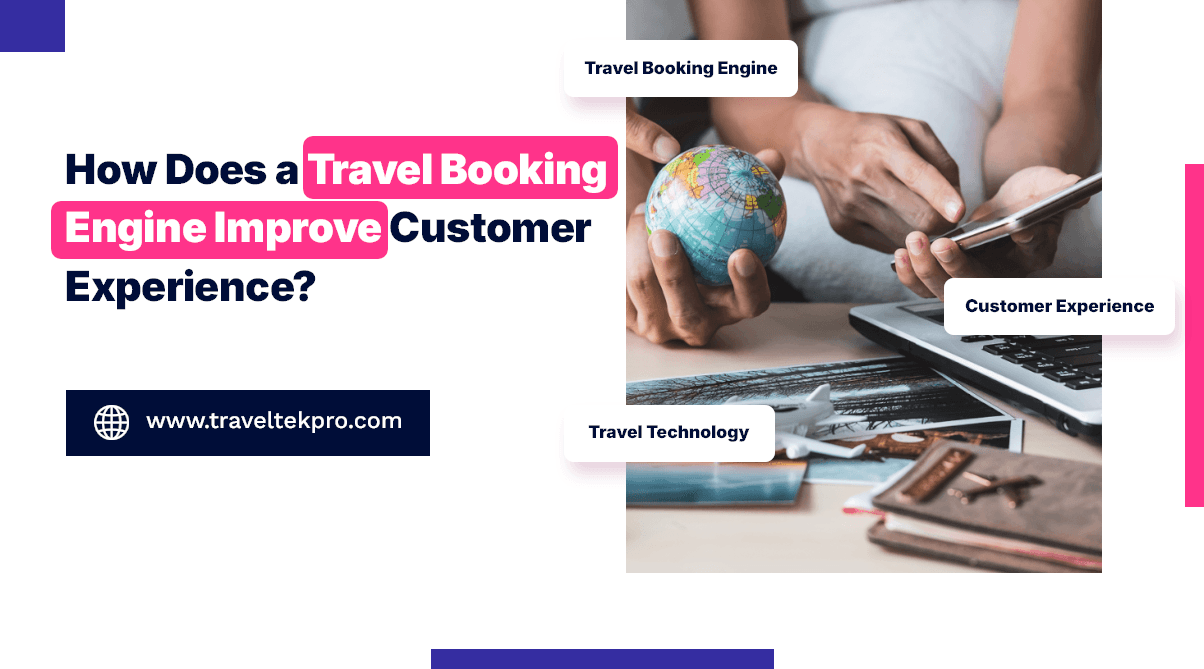How to Set Up Your Own B2C White Label Travel Portal
Dreaming of launching your own online travel business but worried about complicated technology and high expenses? That’s where B2C White Label Travel Portal actually comes into the picture. With millions of people booking their travel all by themselves online now is the perfect time to enter the digital travel world. But building a travel website from scratch can take a lot of time, require a team of developers and also cost you a fortune. That’s the only reason why you should rely on a white label travel portal. It’s your shortcut to success.
A B2C White Label Travel Portal is a ready made online booking system that a company builds for you. You get to brand it with your name logo and design and also offer services like flights, hotels , car rentals and packages directly to your clients. The best part is that you can easily start your travel business in days, not even months. There is no need for you to build your own booking system or negotiate with airlines. You can get access to flights, hotels and cars and justice focuses on customer service and marketing not on tech. The portal is your best bet if you are a first time travel entrepreneur or a traditional travel agent wanting to go online.
What Is a B2C White Label Travel Portal?
A B2C white label portal is a readymade online travel booking system that allows you to sell travel services like flights, hotels, car rentals, and holiday packages directly to customers under its own brand name. The term B2C stands for business meaning the portal is designed for end users who book travel online.
White label means that while the software is developed and managed by another company, it appears as if it’s owned and operated by the travel agency using it. The type of portal is prominent among travel agent startups and tour operators who want to start selling travel products online without building a system from scratch. It’s a completely fast and cost effective professional way to enter the digital travel space.
One of the best parts about B2C white label portal is accessing global travel inventory. Most white label portals come pre-integrated with leading travel APIs and global distribution systems like Amadeus Sabre travelport or content from suppliers like Expedia. This makes it easy for you to offer our customers a huge range of selection of travel services from different parts of the world all in one place. In short you can say that a B2C travel portal gives you everything that you need to run a professional online travel business without having to build or maintain the technology all by yourself. It’s like your own branded travel website but all the heavy lifting is done by the service provider.
Understanding the foundation of white label travel booking engine
Before you dive into the steps it’s important for you to understand how a B2C White Label Travel Portal actually works. You don’t need to build the technology or content yourself. A third party travel technology provider supplies it and you just rebrand it as your own.
Core components of white label travel portal
| Component | Description |
| Booking Engine | Allows customers to search and book flights, hotels, and cars. |
| GDS/API Integrations | Connects to global travel suppliers like Amadeus, Sabre, or Expedia. |
| User Interface (UI) | The front-end your users interact with. |
| Admin Panel | Backend system where you manage your portal, bookings, and customer data. |
| Payment Gateway | Secure payment solutions like Razorpay, Stripe, or PayPal. |
Step-by-step guide to get your White Label Travel Portal
1. Market research and planning
Before launching your white label portal it’s very important for you to start with a thorough market research and understanding. These steps help you understand the travel industry customer behavior and your competition. You can begin by identifying your target audience: are you focusing on budget travelers, luxury tourists or business. Understanding your niche will help you choose the right services to offer like flights, hotels , car rentals or holiday packages. Next, analyze your competitors, look at what other online travel agencies are doing, the services they offer, the pricing strategies and how they attract the customers.
2. Define your goals and niche
Start by answering these questions like who is your target audience: families, corporate travelers or budget backpackers? You also need to understand what services will you offer, just hotel flights or just a full travel package? Where will you focus on local , international or specific destinations? What’s your budget? Think about the fees, monthly maintenance and marketing costs. What makes you unique is better prices, specific tools and even expert support. The clearer your plan the better your white label travel booking engine will actually perform.
3. Choose the right B2C White Label Travel Portal Provider
Firstly, this is a very important step. You need to choose a provider that suits your budget and technical skills. You need to check the travel content. Does it offer the right flights, hotels or tours for your target audience? Can you completely brand the portal to match style? You also need to understand they will help you during setup or after launch and also look for transparent pricing. Is the platform user friendly for both you and your customers?
4. Customize your White Label Travel Portal
Now you need to make the portal your own by uploading your logo and choosing your brand colors, connecting your domain name and adding custom content like blogs, banners , deals and even contact pages. It is very important for you to configure the layout and design if allowed. Some platforms make it very easy for you to make major design changes while others offer prebuilt templates.
5. Set up payment gateway
You need to have a way to collect payments from your customer securely. You can choose payment providers like Razor pay or PayPal. At the same time you must make sure that they support multiple currencies if you are targeting global customers. Sure that the system is PCI compliant and secure. Most of the white label providers will help with the integration during setup.
6. Testing and quality check
Before launching white label travel booking engine, test everything thoroughly. You need to ensure that the search and booking functions are working well, payment processes also in place and mobile responsiveness should be a top priority. Check your load and performance speed besides content accuracy. This step will avoid customer complaints and build trust from day one.
7. Launch and market your portal
Once you are ready to go live you need to announce your launch by using social media WhatsApp and e-mail marketing. You can add keywords like cheap flights to Dubai or best hotels in Goa. Run Facebook ads and Google ads to get your first customers. You can start blogging, writing travel guides or top places to visit besides some travel tips. Always be ready to answer customer questions quickly via chat or email.
Read More: Personalization in B2B and B2C Travel Portals: Why It Matters More Than Ever
Essential features to include
| Feature | Why It Matters |
| Easy User Interface (UI) | Helps users book quickly without confusion |
| Real-Time Inventory | Makes sure flight/hotel prices are accurate and updated |
| Multiple Booking Options | Flights, hotels, cars, packages all in one place |
| Secure Online Payments | Builds trust and ensures smooth transactions |
| Mobile Compatibility | Most users book on smartphones your portal must be responsive |
| Multi-Currency / Multi-Language | Reach global audiences with local currencies and languages |
| Analytics Dashboard | Tracks sales, revenue, most-booked destinations |
| Review & Rating System | Adds social proof and improves bookings |
| CRM & Booking Management | Lets you handle cancellations, rebookings, and customer info |
| Live Chat / Support Options | Keeps customers happy and builds long-term relationships |
How to choose the right B2C white label portal?
Product range and inventory
You need to make sure that the portal offers a huge range of travel services like flights, hotels , car rentals and bus bookings and a lot more. It should also connect with major global distribution systems like amateurs or travel port.
Branding and customization
The portal must allow full customization of your logo color scheme domain name and contact details. It must look and feel like your own brand, not a generic template. This helps you build trust with your customers.
User experience
A clean mobile friendly and easy to use design is very important. Your customers should be able to search, compare and book services quickly. Or a confusing or slow website will turn users away.
Real time booking and updates
It is very important for you to choose a system that provides real time availability and instant confirmations. This reduces the chance of booking errors and improves customer satisfaction.
Payment gateway integration
A reliable and secure payment system is masked. The travel portal should support multiple payment methods and currencies if you are targeting global customers.
Technical Support and maintenance
The technology providers should offer regular updates 24/7 Technical Support and system maintenance. Even if you are not tech savvy you should always have help when needed.
Reporting and admin panel
You will need a powerful back end to track bookings, manage customers, view earnings and analyze business performance. A good admin panel saves a lot of time and makes your job easy.
Cost and scalability
Compare pricing models some charts a one time setup fees while others offer monthly or yearly subscriptions. Also choose a portal that can grow with your business adding more features or inventory as needed.
Post launch tips growing your business
Once you’re like the work doesn’t stop.
1. Keep marketing
You can use influencers, bloggers or affiliates. Offers some deals and coupons to attract repeat customers. You can also run seasonal promotions.
2. understand what’s working
You need to check your analytics regularly to understand what are people booking the most, where are your users coming from and which marketing channel is performing the best.
3. Listen to customers
It’s very important for you to ask for feedback and reviews. If users suggest improvements in Implement them as soon as possible
4. Offer extra services
you need to make your portal a one stop travel shop like add visa assistance offer travel insurance and create customized packages with local guides.
5. Keep innovating
The travel industry is always changing. You need to stay updated with new travel destinations and tech upgrades like AI chat bots or voice search. Don’t think twice before partnering with new suppliers.
So above all you need to know that starting your own B2C white label travel portal is not as challenging as it sounds. You don’t need to be a tech wizard or a millionaire to launch a successful online travel agency. With the right provider, a clear business plan and smart marketing you can build a strong branded portal that competes with big OTAs. Remember the key is planning, choosing the right partner, customizing smartly and continuously marketing. If you’re ready to start your journey as an online travel entrepreneur, Traveltekpro can help you get started quickly. Reach out today for a free consultation.
Read More: How to Integrate APIs and GDS in Your B2B/B2C Travel Portal?
FAQ’S
1. What is a B2C White Label Travel Portal?
A B2C White Label Travel Portal is a ready-made online travel booking platform that lets travel agencies offer services like flights, hotels, and car rentals under their own brand. It’s a cost-effective way to enter the online travel business without building technology from scratch.
2. How does a white label travel booking engine work?
It works by integrating with third-party travel tech providers who offer global travel inventory through APIs. Agencies rebrand the system with their own logo, URL, and design, making it look like their own platform while the backend is managed by the provider.
3. How do I choose the right white label portal provider?
Look for a provider that offers powerful API connections, customizable branding, global inventory, secure payment gateways, responsive support, and scalability. A smooth user experience and post-launch tech support are key factors too.
4. What are the benefits of launching a white label travel portal?
You can launch your travel business faster, automate bookings, access global suppliers, offer real-time availability, and grow your online brand all without high upfront costs. It’s a smart move for startups and agencies going digital.
5. Can I earn commissions with a B2C white label travel website?
Yes! You earn profits through commissions or margins on every flight, hotel, or holiday package booked via your portal. The more you promote and scale your platform, the higher your potential earnings.
6. Is white label travel software scalable for growing agencies?
Definitely. Most white label travel solutions are built to grow with your business. You can easily add more services, payment options, and supplier integrations as your brand expands.
Let's Start Your Project
Let us help you achieve your goals, by creating the best solution for you!




